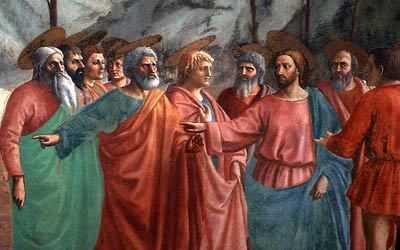 (Ezr 9:5-9; Tobit 13:2, 3-4A, 4BEFGHN, 7-8; Lk 9:1-6)
(Ezr 9:5-9; Tobit 13:2, 3-4A, 4BEFGHN, 7-8; Lk 9:1-6)
One of the most interesting ways to read the Old Testament is to realize its intimate link to the New Testament. The former foreshadows the latter, and the latter fulfills the former. Thus when you read certain passages of the Old Testament, it’s illuminating to see how the message reflects – directly or indirectly – the coming of Christ.
Such is the case with today’s reading from Ezra. Although the passage immediately before this reading is Ezra’s denunciation of marriages between Jews and non-Jews (which segues into today’s Old Testament exhortation), I don’t feel particularly qualified or inspired to reflect on today’s passage in that context. However, what jumped out at me after careful consideration was the final section. Check out Ezra 9:8…
“And now, but a short time ago, mercy came to us from the LORD, our God, who left us a remnant and gave us a stake in his holy place; thus our God has brightened our eyes and given us relief in our servitude.”
Ezra was writing before Christ, but – in a different context – those words still resonate today. In the grand scheme of the universe, Christ’s arrival was a short time ago. He brought mercy for all those who came to him, making possible our salvation into the Kingdom of Heaven. Though none of us were alive for Christ’s ministry on Earth, he still remains with us, in the form of the Eucharist; the Father also sent the Holy Spirit, who remains with us as well to this day. Indeed, how could our eye not be brightened by the presence of God in our lives?
But see the last of that line: God has “given us relief in our servitude.” Notice how it segues into Ezra 9:9.
“For slaves we are, but in our servitude our God has not abandoned us…”
The Baltimore catechism’s famous distillation says our reason for existing is to know God, love God, and serve God in this world, to be happy with God forever in heaven. Our Lord is not one of the capricious mythological deities like Zeus or Thor, for whom ancient worshippers performed sacrifices lest they be struck by lightning. No, we serve the Lord because we want to. We serve the Lord by doing as Christ instructed us: spreading his good news, feeding the hungry, clothing the naked, comforting the afflicted, and so on. Ideally, so great is the joy in our hearts that serving the Lord is not burdensome. Christ himself makes this clear; see, for example, Matthew 11:28-30:
“Come to me, all you who labor and are burdened, and I will give you rest. Take my yoke upon you and learn from me, for I am meek and humble of heart; and you will find rest yourselves. For my yoke is easy, and my burden light.”
If we well and truly take on the works that Christ exhorts us to do — with faith in our hearts — then our servitude should be easy, leading to happiness in this world and happiness with God forever in Heaven.
Indeed, the notion of doing the works of Christ is foremost in the Gospel selection from Luke, which details the commissioning of the Twelve apostles. I wrote recently about the version of this story from the Gospel of Matthew, but reading it again, I’m struck by that notion of servitude; yes, they were doing the will of Christ, but they were not forced to do it, like slaves. We are all born as slaves to sin, but Christ has set us free; we are given relief in our servitude by the Spirit.
Ezra 9:9 concludes: “Thus he has given us new life to raise again the house of our God and restore its ruins…”
Adam and Eve’s first disobedience led to the mark of original sin that remains with humanity to this day. Cast from Eden, mankind has longed for the return to paradise. Christ restores the ruins of our broken nature, the ruins of the paradise lost. We may labor, but laboring for God gives us relief. The Kingdom of Heaven awaits those who trust the Lord and work with for Him… and work with Him. The new life awaits.
No, Ezra had no knowledge of Christ when he started writing the Biblical book that bears his name, centuries before the birth of Jesus. But the Bible was divinely inspired, to serve a larger whole, and Ezra’s words echo strongly with me today. And so I consider what it means to be given relief from servitude… and rededicate myself to serve the Lord as best I can.
